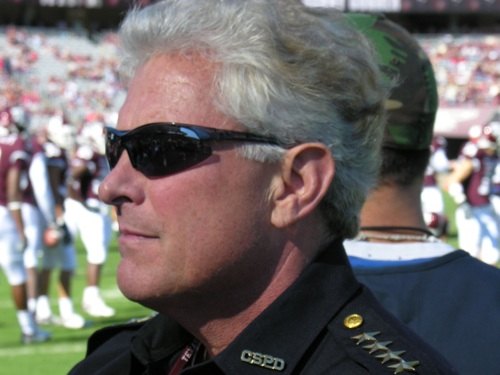Texas Police Chief: "Fired for Questioning Red Light Cameras"
Questioning the wisdom of photo enforcement can be fatal to the career of a top law enforcement official. Former Texas police Chief Michael Clancey found this out the hard way when he dared to suggest that the College Station City Council should not use red light cameras as a budgetary tool. Clancey filed a lawsuit in federal court last month demanding punitive damages and back wages from the city which, he claimed, violated his First Amendment rights.
From Clancey’s lawsuit:
When the city first considered implementing red light cameras, the program was justified as a revenue-generating program, and was listed for public discussion and comment on the city council docket. Clancey voiced his opposition to the description of the program, explaining that he believed the red light project should be based upon concerns for public safety. This matter was not raised by Clancey in his official capacity. Rather, Clancey expressed his opinion as a citizen of College Station.
According to the suit, City Manager Glenn Brown and Assistant City Manager Kathy Merrill retaliated by giving Clancey a sharply negative performance review.
Mr Brown and Ms Merrill failed to provide any details for how Clancey could improve his performance. Rather, Clancey was simply told to improve his performance by November 1, or he would be subject to termination, and provided no direction that would allow him to meet management’s expectations.
Clancey claimed that he never had a chance to defend himself to city officials before he was given the choice of resigning or being fired on October 26, 2007. Clancey chose to cite “family reasons” and resign.
Clancey’s dilemma sheds light on the difference in opinion regarding photo ticketing in the law enforcement community. Top brass, represented by the International Association of Chiefs of Police, not only endorse the use of red light cameras and speed cameras, the organization makes money from “certification” of the devices.
On the other hand, officers in the field tend to oppose automated ticketing machines. The Phoenix Law Enforcement Association, for example, represents over 2600 police officers in Phoenix, Arizona. The group recently testified against the state’s photo radar program.
Clancey started his law enforcement career thirty years ago in Alexandria, Virginia, where he rose from beat cop to captain before taking the job of chief in Westerville, Ohio, in 1999. Clancey took the higher-profile College Station job in 2005. The crime rate dropped sixteen percent during his tenure.
For its part, College Station officials released an internal affairs report attacking Clancey for his involvement in the cancellation of a “failure to obey a police officer” ticket issued by a rookie officer on October 9, 2007 to the daughter of a police lieutenant. The report was finalized after Clancey was forced to quit.
More by The Newspaper
Latest Car Reviews
Read moreLatest Product Reviews
Read moreRecent Comments
- Lou_BC Well, I'd be impressed if this was in a ZR2. LOL
- Lou_BC This is my shocked face 😲 Hope formatting doesn't fook this up LOL
- Lou_BC Junior? Would that be a Beta Romeo?
- Lou_BC Gotta fix that formatting problem. What a pile of bullsh!t. Are longer posts costing TTAC money? FOOK
- Lou_BC 1.Honda: 6,334,825 vehicles potentially affected2.Ford: 6,152,6143.Kia America: 3,110,4474.Chrysler: 2,732,3985.General Motors: 2,021,0336.Nissan North America: 1,804,4437.Mercedes-Benz USA: 478,1738.Volkswagen Group of America: 453,7639.BMW of North America: 340,24910.Daimler Trucks North America: 261,959


































Comments
Join the conversation
the way i look at it is that Hitler fired a lot of his lieutenants who didn't tow the party line (and worse) i'm sure the US Army had to sift thru a lot of people before they found the 'right' kind of person to run Gitmo and Abu Ghraib texas and other local council 'organs' (!!!) are really no different
You want justice? Do not reelect incumbents.